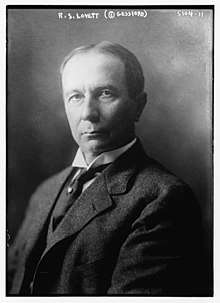Robert S. Lovett
Robert Scott Lovett (June 22, 1860 – June 19, 1932) was an American lawyer and railroad executive. He was president and chairman of the board of the Union Pacific Railroad and a Director of both The National City Bank of New York and Western Union.[1]

Biography
Early life and family
Born at San Jacinto, Texas, he was the son of William Lovett and Susan Hardy Lovett. His mother died in 1861 when Robert was only one year old; he was raised by Sarah Elizabeth "Sally" Hood Lovett, his father's second wife.
In 1890, he married Lavinia Chilton Abercrombie, daughter of lawyer and Texas state senator Leonard A. Abercrombie, granddaughter of Justice William Parish Chilton. Their only child was noted politician Robert A. Lovett.
Career
He was admitted to the bar in 1882, and then served as attorney for various railroad interests.
From 1904 to 1909 Robert S. Lovett was general counsel, and after 1909 president, of the E. H. Harriman system of railroads—the Union Pacific and Southern Pacific. In the wake of the Northern Securities Case he was compelled to dissolve the Southern Pacific and Union Pacific merger in 1913. In 1914 he accepted directorships in the New York Central and Nickel Plate railroads. Consequently, the Lovett family settled into a "Gold Coast" mansion at Locust Valley, New York. During World War One he filled important positions in the management of railroads, and was chosen president (1919) and chairman of the Board of Directors (1920) of the Union Pacific System.
Legacy
In World War II, the United States liberty ship SS Robert S. Lovett was named in his honor.
See also
References
- Bryant, Keith L., Jr., Editor. Encyclopedia of American Business History and Biography, Railroads in the Twentieth Century. New York: Facts on File, 1990.
- Frey, Robert L., Editor. Encyclopedia of American Business History and Biography, Railroads in the Nineteenth Century. New York: Facts on File, 1988.
- Klein, Maury. The Life and Legend of E.H. Harriman. Chapel Hill [N.C.]: University of North Carolina Press, 2000.
External links
| Preceded by vacant |
Chairman of the Southern Pacific Company Executive Committee 1909 – 1913 |
Succeeded by Julius Kruttschnitt |
| Preceded by E. H. Harriman |
President of Union Pacific Railroad 1910 – 1911 |
Succeeded by A. L. Mohler |
- Directory Directory of Directors in the City of New York, Audit Company, New York, 1915. pages 797 and 845. Retrieved February 22, 2018.